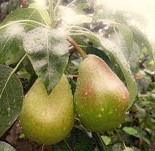My Old Father used to say that “you plant pears for your heirs”. This may have just been his North England pragmatism shining through but he had a point then – but not now. Planting fruit trees now will repay you almost from year one. Whether it is apples, pears, plums, greengages, peaches or nectarines, it is never too early to plant your own orchard and thanks to the different rooting stocks you can have fruit trees to suit the size of every garden and most of the soils. The choice of variety depends on what you like but if it was my garden, I would start with ‘Victoria’ plums to eat straight off the tree, and 'Bramley’s seedling’ apple for crumble, ‘Egremont Russet’ to eat off the tree, and a greengage for jam.
 There are minor fruits that make excellent garden plants and are useful from a culinary point of view. Yellow crab apples, such as “Butterballs” make wonderful jelly that flower and fruit very heavily and make excellent jelly that sets like rubber. Quince (Cydonia oblonga) is a large bush that have big white flowers in the spring and the beautiful aromatic pear-like fruits that go so well in pies, crumbles, and jelly. Medlar (Mespilus germanica) is a lovely small tree or large shrub that have pinky-white flowers followed by fruits that were clearly created close to 5 p.m. on a Friday night in the workshop of creation. The Umpa-Lumpas were just finishing the last species of the week when they ran out of skin for the fruit. Not wishing to make another trip to the storeroom, they released the thing into the wild without enough skin, hoping that no one would notice. The autumn colour of the leaves and the russet colour of the fruits are perfect. There are minor fruits that make excellent garden plants and are useful from a culinary point of view. Yellow crab apples, such as “Butterballs” make wonderful jelly that flower and fruit very heavily and make excellent jelly that sets like rubber. Quince (Cydonia oblonga) is a large bush that have big white flowers in the spring and the beautiful aromatic pear-like fruits that go so well in pies, crumbles, and jelly. Medlar (Mespilus germanica) is a lovely small tree or large shrub that have pinky-white flowers followed by fruits that were clearly created close to 5 p.m. on a Friday night in the workshop of creation. The Umpa-Lumpas were just finishing the last species of the week when they ran out of skin for the fruit. Not wishing to make another trip to the storeroom, they released the thing into the wild without enough skin, hoping that no one would notice. The autumn colour of the leaves and the russet colour of the fruits are perfect.
However, fruit trees are not just for you; they will support a plethora of invertebrates and larger animals. The flowers will lure the pollinators into the garden and some birds will snack on these. The fruit will provide very important nutrition for birds as they stock up for the winter. In particular large birds that cannot perch and eat will relish the windfalls.
So, if you have the space, plant some fruit trees this winter. if you do not have space, make some.
Timothy Walker
Horticulture Tutor
If you would like to learn more about growing fruits, why not have a look at our eBook Growing Tree Fruits in Temperate Climates or even consider a course on Fruit Production in Temperate Climates.
|
Latest
Categories
Archive
|